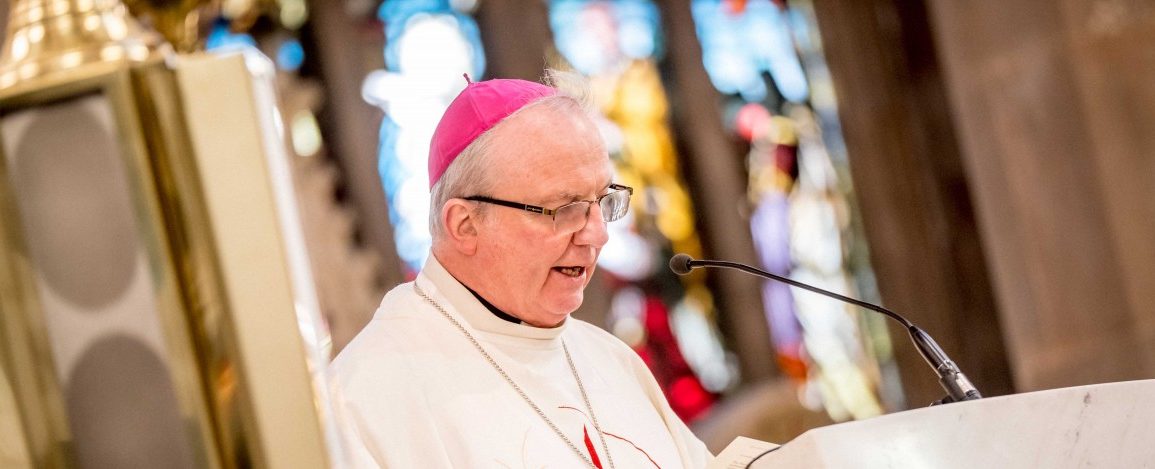The following homily was preached during Mass to celebrate the Feast of the Holy Family on December 26, 2021. by Bishop Donal McKeown of Derry, Ireland.
***
Yesterday we began a journey through the twelve days of Christmas with the characters who make up the Christmas story. These were not static figures, living in a stable with fixed visiting hours. The days surrounding the birth of Jesus were a confusing time as they stumbled from one unexpected event to another, without time to make sense of what was happening. No wonder that Mary had many things to ponder in her heart. So what does this feast tell us?
Firstly, today may be the feast of the Holy Family – but it is also the feast of a wholly unusual family. There was nothing typical about Jesus, Mary, and Joseph. None of the simple rules for Jewish families in the Holy Land applied. But their holiness came from how they faced the unpredictable situations that they all had to face. And, for all of our families, that is where holiness is won from the hard rock of life. Family and holiness never come neatly packaged and tied up with a red ribbon. Many of the great saints came from strange backgrounds and had chequered lives. Their holiness came from working through the often-painful realities that they had to face. So many of our families would not pass the test as perfect families. We are all scarred by the circumstances of our life. Holiness is closer to heroism than it is to apparent perfection. No family situation is beyond the grace of God. Don’t compare your family to somebody else’s. Be grateful for the graces that you have. It is in the reality of your life that love and forgiveness can be at work, whatever the obstacles.
Secondly, Christmas tells about God giving Himself in Jesus. And many of the problems that we know from our neighborhoods are connected with a culture that prioritizes selfishness. A market jingle that puts me and my wants at the center of the world closes us in ourselves. The idea of faithful family relationships calls us out of a preoccupation with self and our hurts and challenges us to build bridges. A society that encourages and promotes long-term stable committed relationships is a healthy society. A society that is not sure what it promotes and ends up facilitating transitory relationships is unhealthy. What brings out the best in human beings brings out the best for human beings. A philosophy that tells us to expect little will bring little of beauty to birth. The Christmas message of faithfulness and forgiveness is tamed when we put it in a crib with candles and twinkling lights and then walk away.
But Christmas is about divine solidarity with us and an invitation to walk with one another, especially through the hard times. God in Jesus is with us, even when things go wrong and we are blinded or crippled, rejected or lonely. Jesus in the Holy Family asks us to take one step at a time, giving priority to generosity and outreach. That makes us adults. Selfishness and recrimination give us the shallow satisfaction of claiming to be a victim. But that is not food for the long journey, just more fuel for the fire of anger that will never go out, even when somebody else is made to pay. And it keeps us prisoners of childhood pain and forgives childishness. The feast of the Holy Family draws us away from the static crib and asks us to walk the rough road with others, knowing that that faithfulness and solidarity will lead to unexpected graces and blessings.
Thirdly, the Holy Family tells us that there is something profoundly sacred about human relationships. They are not merely useful and often pleasant. When marriage is reduced to a legal contract, then it remains a human construction that is by definition flawed. When we accept that marriage is something sacred, then we are drawn into a different space where grace can play a part. When we proclaim by word and deed that marriage and family are of eternal beauty and value, that gives both a vision and support to all involved. In a secular world, preparation for Church marriages needs to be clear about the divine dimension of a committed intimate relationship of mind and body. That will be unwelcome when the emphasis on me is challenged. When relationships assume that it is about me and the latest gimmicks of the marriage market, then there is little space for the voice of God who calls me beyond myself. Any sort of semi-detached approach to profound relationships is terribly damaging for the partners and particularly for children who may be affected.
When a society abandons the idea of the sacredness of the family, it does not offer freedom and joy. Rather, it lowers expectations and promotes a lack of responsibility and maturity. As the old saying goes, the problem with free love is that someone always pays the price. The feast of the Holy Family invites us to see our families beautiful and sacred, despite their scars.
The Twelve Days of Christmas are about more than sweet cribs and childhood memories. Jesus came into the messiness of the world to offer healing and hope. The family can be a key place where love, relationships, and responsibility are promoted. When it is presented as little more than a contract that can be dumped when the going gets tough, then we are all diminished.
Today we pray for all families that they can be the best they can be for the sake of all involved. And we pray that, even when people have been hurt and damaged by close relationships, they will rediscover hope and healing.
Holy Family of Nazareth, in all your example and holiness, pray for us. Amen.










